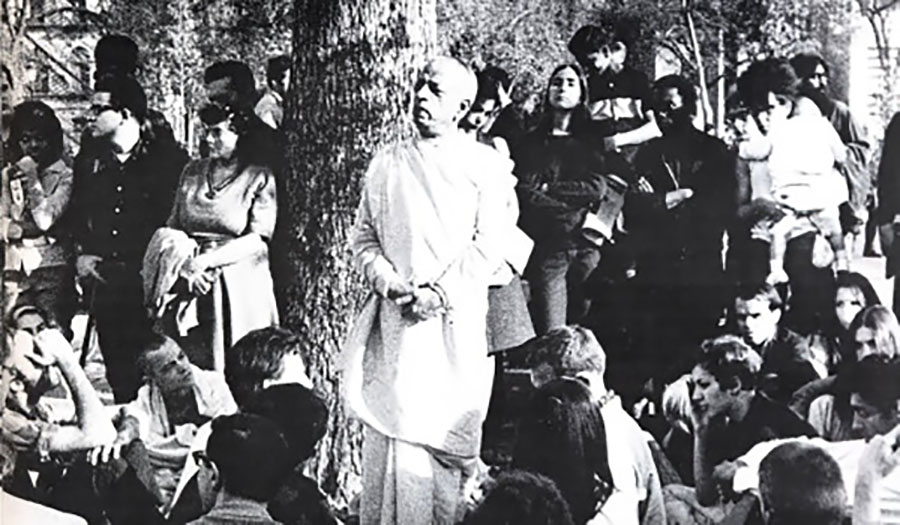ISKCON 50 Meditations: January 24, 2016
By Satsvarupa dasa Goswami | Янв 24, 2016

Prabhupada’s Expressions
Recently an initiated devotee, who has broken his connection with ISKCON, made some sharp criticisms against what he called “ISKCON-speak,” the jargon used among devotees. He made a list of jargon words and said they should all be thrown out. This critic of “ISKCON-speak” traced many of the “faulty” expressions to the fact that while Srila Prabhupada spoke English as a second language and his expressions were fine for him, they are unfit for those who speak American or English as a mother tongue. I looked over the critic’s list and agreed with some of his choices, although I could not see how he managed to get rid of habitual expressions, such as “take rest,” “foodstuffs,” “take Прасадам,” and the pronunciation of the word “de-vo-tee.”
We should not feel guilty if newcomers hear Prabhupada’s followers use many curious expressions not usually heard in the English language; there is jargon in every profession and subculture. Americans are notorious for using bloated language to cover the direct energy of their speech and to unnecessarily complicate it. Jazz musicians think they are speaking naturally; so do construction workers. One person’s idea of unencumbered speech is another person’s version of artificial talk; often one group can hardly understand another.
It is possible to simultaneously cherish Prabhupada idioms while avoiding some of them in our lecturing and speaking. Some expressions were used by Prabhupada in a particular way, but are grammatically incorrect or archaic. Yet some devotees may see any criticism of ISKCON jargon as insulting to Srila Prabhupada when it is done in a cold-hearted way, without understanding the attachment we have for His Divine Grace and the way he speaks.
The solution to such perceived language misuse is not to eliminate strong teachings of surrender; neither will eliminating the strong preaching spirit help. We have to be sensitive and non-hypocritical. We should be “context sensitive,” speaking with awareness of time, place and persons. On the other hand, if we use ISKCON-speak in a way that is insensitive or unthinking, we may become offensive to our fellow devotees. Hackneyed speech can become a hackneyed way of thinking. We then fall into a habit of speaking without expressing our feelings or realization. We speak “the party line.” If I try to manipulate a fellow devotee by speaking officialese, it is offensive to the devotee and to the philosophy which I claim to represent. Devotees are repelled when they hear another devotee rattle off words which demand obedience and surrender to the highest ideal, although the speaker of those words is himself not following them. “Don’t be on the mental plain, prabhu. Prabhupada wants us to cooperate. Therefore, you should do what I say.”
Let’s face it, we do use language in a special way in ISKCON, and it is not all bad. Many of the words we use are the best translations of Sanskrit terms. Prabhupada translated words such as “aparadha” into “offense,” and “Bhagavan” into “the Supreme Personality of Godhead.” We could change these terms into some other ones, but we feel safe that Prabhupada has put his unique realization into the translations. Prabhupada writes in one purport that we are more interested in the techniques of бхакти-йога than in the language itself. In the name of purifying language, a pedant might remove the realization.















